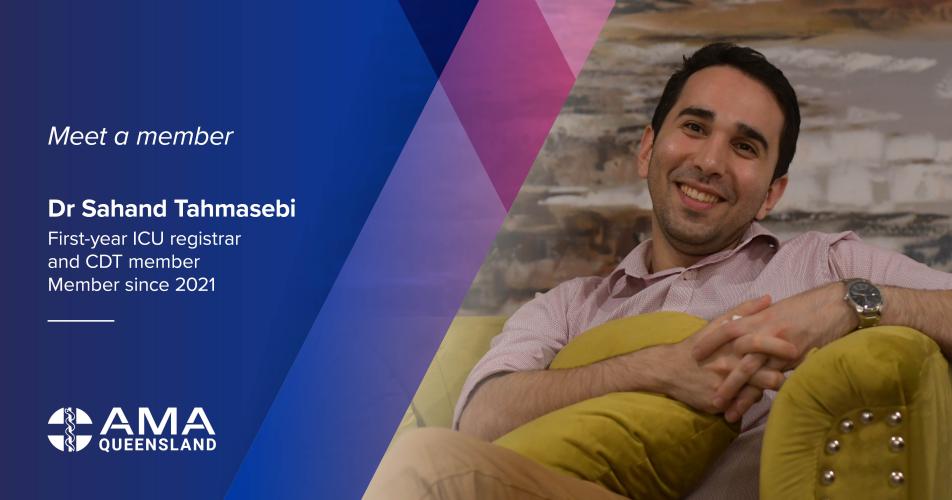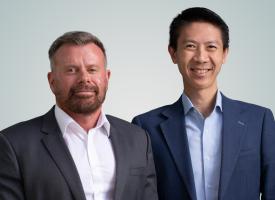Dr Sahand Tahmasebi – Meet a member
Dr Sahand Tahmasebi never dreamt of studying medicine as a child and, in fact, spent majority of his journey into the profession in survival mode. Despite the odds, he’s now a deeply committed first-year ICU registrar and member of the AMA Queensland Committee of Doctors in Training (CDT).

Born and raised in Iran, Dr Tahmasebi felt professional his options after high school were restricted. Due to the complexity of politics in Iran, working in the social sciences was risky, but many safer options like engineering and law were never appealing.
“If you get good marks in high school in countries like Iran, you’re encouraged to do so-called higher programs like medicine, dentistry, law, or engineering,” Dr Tahmasebi said.
“I did not want to become an engineer despite my optimal grades in physics and mathematics and although I always liked the social sciences, I knew they were not a safe option for me in Iran.
“So, because of my deep interest in biological sciences and human physiology, I figured medicine seemed a more appealing degree than other options. So that’s what I decided to do.”
Dr Tahmasebi was seriously doubting his career decision after two years of study. However, his circumstances left him with little choice.
“I hated the dry and volatile nature of subjects like biochemistry. I just wanted to withdraw from the program and switch to some other degree,” he said.
“But if I wanted to withdraw, I would have had to serve in the military in Iran. This is mandatory if you’re not studying continuously.”
After taking a six-month break he continued his studies, soon to discover his underlying passion for working with and caring for people.
“The first time that I felt like I was meant to be in medicine was when I did my first hospital rotation in Iran,” he said.
“The interaction with the patients, working with a team and everything about clinical work was basically what I wanted for my life.
“That was the beginning of it. I never had those kind of childhood dreams of becoming a doctor. I always wanted to become a pilot or a politician, but then I ended up in medicine.
“So initially it was not by choice. But I think it was a case of life taking you to medicine because you're a good student.”
During his fifth year of study Dr Tahmasebi was presented with another in a line of many roadblocks when his family decided to move to Canada for better quality of life.
“I basically withdrew from the program and moved to Canada with my family and stopped studying medicine for at least eight years,” he said.
“When you're studying in a so-called low-income country, if you withdraw from the program, which was the case for me, you basically have to start from scratch.
“Back then, my English was not good enough to apply for any post-graduate program. So, when I moved to Vancouver, I studied one year of English as a second language before I could do my undergrad degree as a requirement to go back into medicine.”
Dr Tahmasebi’s plans changed during his time in Vancouver, and he decided to take a brief hiatus from medicine to study a Bachelor of Psychology and Neuroscience before working in clinical research.
“It wasn’t until 8 years after immigration that I decided to move to Australia to study medicine and got an offer from the University of Queensland (UQ),” he said.
“I think I made an informed decision when I was in the middle of my studies in Iran. But then when I left, it kind of felt like an unfinished job and something that I always wanted to do.
“So, despite studying psychology and neuroscience, I just always wanted to go back to clinical work, and that's why I worked in clinical research, because that was the closest I could get.”
Dr Tahmasebi graduated from UQ in 2023 with vast experiences working as an intern in regional towns under his belt. From Rockhampton to the Gold Coast, he has finally found himself feeling somewhat settled in Bundaberg.
“It's been challenging, moving all the time. Sometimes it's kind of like survival, rather than normal living,” he said.
“I have moved three different countries and 10 different cities in my life. It never gets easier; it actually gets much harder every time you move.
“The nature of being a junior doctor in Australia means you have to move around a lot until you get into more senior years of training. This has its positives of exploring different areas of the country, but it’s obviously challenging from the social and the psychological aspect of it.”
Although he’s been able to find many positives, the challenges he faced during this time largely motivated him to become involved in advocacy work.
“I joined AMA Queensland and the CDT as an intern in Rockhampton, working in an undersubscribed but high workload environment where it was discouraged to claim overtime,” he said.
“I remember in the first couple of months, I had more than 80 or 90 overtime hours that were unclaimed.
“I was overwhelmed, tired and constantly fatigued. So, I decided to just move back to Canada because I didn't want to stay here anymore.”
Before he could follow through with this decision, a colleague put Dr Tahmasebi in touch with AMA Queensland.
“I called AMA Queensland and said – this is the situation – and they said – okay, leave it to us," he said.
“Literally two days later I had a meeting with the head of department and the junior doctor supervisor where my overtime claims were approved. By the next Monday the department sent a comprehensive email regarding overtime claims.
“This was when I realised the advocacy role and influence AMA Queensland had over the HHSs.”
Quickly after, Dr Tahmasebi became a member of the AMA Queensland CDT as the Rockhampton and Gladstone representative. He is now one of the committee’s Industrial Relations Special Interest Group members where his priorities lie in the wellbeing of other junior doctors.
“It's a very fatiguing and a long process to become a senior doctor in Australia. I think that makes the advocacy for junior doctors more important,” he said.
“Research used to be a career goal, but I'm now more interested in leadership and advocacy.
“So, my main goal on CDT is to focus on the well-being of juniors, because it’s the most valuable time of anyone's life.”



